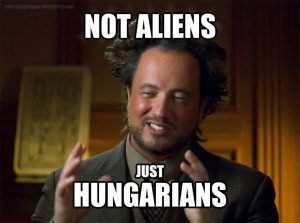Brilliant wordplays of the Hungarian language

Change language:
As you might know, we are very much fascinated by the curiosities of the Hungarian language, even though it is our mother tongue. The Hungarian grammar may seem like and endless forest, but we try to bring it closer to our readers with fun articles about our language. This time, we collected some wordplays which give an insight into the brilliant complexity of Hungarian.
According to the definition, a wordplay or play-on-words is a literary technique and a form of wit in which the words that are used become the main subject of the work, primarily for the purpose of intended effect or amusement. The following Hungarian wordplays – based on a former article by szeretlekmagyarorszag.hu – might cause some confusion due to the key that have several meanings. We could go on and about trying to explain them grammatically, but since we’re not linguists, we tried to translate them in an understandable way. Hopefully you get the gist of them. Enjoy! 🙂
- “Tiszta víz a ruhám, és ez a te lelkeden szárad”, which literally means “My clothes are soaking wet and this dries on your soul”. The expression “to dry on your soul” (te lelkeden szárad) means that something is your fault in Hungarian. So this way, the wordplay contrasts wet and dry.
- “Mostanában a szép dús haj olyan ritka…”, which means “Nowadays nice, thick hair is so rare…”. The word “ritka” has two meanings: rare and thin, so this wordplay contrasts thick and thin.
- “Az üzleti találkozómat egy evőeszközboltnál beszéltem meg. Kések”, which means “I’ve arranged my business meeting at a cutlery shops. I’m going to be late.” The Hungarian noun “kés” means knife, while the verb “késni” means to be late. So by saying “kések” I mean that I’m going to be late, but it literally means “knives” which goes perfectly well with a cutlery shop.
- “A hóhért grimaszversenyre küldték. Eszmélelen fejeket tud vágni”, which literally means “The hangman was sent to a grimace competition. He can cut incredible heads” but it figuratively means that “he can pull incredible faces”. The Hungarian compound “fejet vág” has two meanings: to behead and to pull faces/grimace. This is why it is connected to a hangman in a quite bizarre way.
- “Hogyan lehet egyszerűen repülőt hajtogtani? – Repülő, repülő, repülő…” could be literally translated to “How can you easily fold an airplane? – Airplane, airplane, airplane” but the trick here is the Hungarian verb “hajtogatni”. It means to fold and also to repeat, this is why the answer is “airplane, airplane, airplane…”.
- “Kannibál harcosok kínálják egymást: Kérsz egy katonát?” which literally means “Cannibal warriors offering each other: Would you like a soldier?”, but the Hungarian noun “katona” has two meanings: soldier and bite (of food). So they are actually offering food bites to each other.
- “Egy tudóscsoport lázasan kutatja a malária ellenszerét” which can literally be translated to “A research group is feverishly searching for the antidote of malaria”. However, the Hungarian adverb “lázasan” can also mean keenly, zealously besides feverishly which is, again, a bit bizarre connection to malaria.
- “A magyar katonák a csatában hadilábon álltak” which means “The Hungarian soldiers were at odds in the fight”. The literal translation of “hadiláb” would be something like “war-leg” which makes no sense in English, but it goes well with soldier and fight. Otherwise, it means to be at daggers drawn with somebody.
- “A focisták a 90. percben az utolsókat rúgták” which literally means “The football players were doing their last kicks in the 90th minute”, but it figuratively means “The football players were on their last legs in the 90th minute”. So the expression “utolsókat rúgja” (last kicks) means to be on one’s last legs in English.






